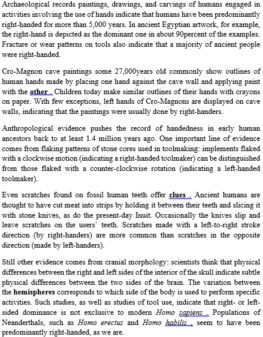Read the following passage and mark the letter A, B, C, or D on your answer sheet to indicate the correct answer to each of the questions from 28 to 35.
If you could travel back in time five centuries, you'd encounter a thriving Aztec empire in Central Mexico, a freshly painted "Mona Lisa" in Renaissance Europe and cooler temperatures across the Northern Hemisphere. This was a world in the midst of the Little Ice Age (A.D. 1300 to 1850) and a period of vast European exploration now known as the Age of Discovery. But what if we could look 500 years into the future and glimpse the Earth of the 26th century? Would the world seem as different to us as the 21st century would have seemed to residents of the 16th century? For starters, what will the weather be like?
Depending on whom you ask, the 26th century will either be a little chilly or infernally hot. Some solar output models suggest that by the 2500s, Earth's climate will have cooled back down
to near Little Ice Age conditions. Other studies predict that ongoing climate change and fossil fuel use will render much of the planet too hot for human life by 2300.
Some experts date the beginning of human climate change back to the Industrial Revolution in the 1800s, others to slash-and-burn agricultural practices in prehistoric times. Either way, tool-wielding humans alter their environment -- and our 26th century tools might be quite impressive indeed.
Theoretical physicist and futurist Michio Kaku predicts that in a mere 100 years, humanity will make the leap from a type zero civilization to a type I civilization on the Kardashev Scale. In other words, we'll become a species that can harness the entire sum of a planet's energy. Wielding such power, 26th-century humans will be masters of clean energy technologies such as fusion and solar power. Furthermore, they'll be able to manipulate planetary energy in order to control global climate. Physicist Freeman Dyson, on the other hand, estimates the leap to a type I civilization would occur within roughly 200 years.
Technology has improved exponentially since the 1500s, and this pace will likely continue in the centuries to come. Physicist Stephen Hawking proposes that by the year 2600, this growth would see 10 new theoretical physics papers published every 10 seconds. If Moore's Law holds true and both computer speed and complexity double every 18 months, then some of these studies may be the work of highly intelligent machines.
What other technologies will shape the world of the 26th century? Futurist and author Adrian Berry believes the average human life span will reach 140 years and that the digital storage of human personalities will enable a kind of computerized immortality. Humans will farm the oceans, travel in starships and reside in both lunar and Martian colonies while robots explore the outer cosmos.
Question 29: The word “infernally” in paragraph 2 is closest in meaning to
A. differently
B. extremely
C. permanently
D. contemporaneously













